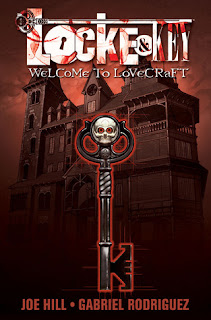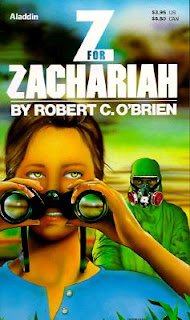Locke and Key: If Stephen King Wrote 100 Cupboards
A while back, I got the audio adaptation of Joe Hill and Gabriel Rodriguez's graphic novel series Locke and Key as part of a promotion on Audible. I haven't delved into it yet, and when my local library picked up the whole series I decided to check out the source material before diving into it.
Before I go into the story, let me be frank: this is not a series for younger readers. It's probably not for a lot of older readers, either. Joe Hill is Stephen King's son and it shows in everything he writes, for better or worse. This series deals with graphic violence, alcoholism, death, murder, and creatures called (for lack of a better term) demons. Extreme profanity and vulgarity pepper the dialogue throughout. Proceed with caution and discernment.
That being said, there are some good bones in this story. As the title suggests, my first impression of this series (volume 1 pictured above) was that it was N. D. Wilson's 100 Cupboards if Stephen King were writing it. There's ancestral mansions, magical doors and keys (not all of which are very nice) and an old enemy of the family come to claim vengeance for the previous generation's deeds.
But after the first volume, the similarities (such as they are) fall away and Hill and Rodriguez really dive into the world they've created.
Following the brutal murder of their father, Tyler, Kinsey, and Bode Locke move back to their family's ancestral home of Keyhouse in Lovecraft, Massachusetts, along with their mother, Nina. Soon after, Bode finds a key that lets him pass through a door and come out as a ghost. His family disbelieves his story, but soon Tyler discovers the truth of it when his father's murderer, a former classmate of Tyler's, shows up and tries to finish off the family. In the aftermath, a dark spirit, an echo, escapes from the wellhouse on the Keyhouse land. This spirit, known as Dodge, has a score to settle with the Locke family, and it knows a lot more about the keys scattered around the mansion than the Locke children.
The story progresses through five more volumes, following the Lockes as they gather themselves and move on from their grief and trauma. Sometimes they make really poor decisions, and sometimes they grow in unexpected ways. The past keeps coming back to haunt them, and Dodge's plots always seem to strike them at vulnerable times. The story of their lives isn't always a pleasant one, but it is strikingly honest in its portrayal of the aftermath of personal decisions. Relationships are broken and not always repaired.
The thing that makes this story worth all the mire is that it never quite loses hope. Hope that the Lockes will win the day. Hope that they will find peace and new life on the other side of their grief. Hope that they can overcome their inner demons. The series isn't strong in its religious overtones. Aside from the flashback sequence in the 1700s, there's hardly any mention of God or religion. The closest it comes is a conversation about death and what comes after in which souls are described as dust motes in the sunlight vibrating in tune with the rest of the universe. But as I said, it is a hopeful story, and that hope is what allows it to be worthwhile.
If you enjoy darker stories like those of Stephen King and Joe Hill, you'll be glad to read this series.
There's also a Netflix adaptation in the works, but until the rating and content are revealed, I can't quite bring myself to be excited. The story is perfectly plotted for a TV serial, but unless Netflix reins in the violence and language factors, I'll have to pass seeing this one on the small screen.
Before I go into the story, let me be frank: this is not a series for younger readers. It's probably not for a lot of older readers, either. Joe Hill is Stephen King's son and it shows in everything he writes, for better or worse. This series deals with graphic violence, alcoholism, death, murder, and creatures called (for lack of a better term) demons. Extreme profanity and vulgarity pepper the dialogue throughout. Proceed with caution and discernment.
That being said, there are some good bones in this story. As the title suggests, my first impression of this series (volume 1 pictured above) was that it was N. D. Wilson's 100 Cupboards if Stephen King were writing it. There's ancestral mansions, magical doors and keys (not all of which are very nice) and an old enemy of the family come to claim vengeance for the previous generation's deeds.
But after the first volume, the similarities (such as they are) fall away and Hill and Rodriguez really dive into the world they've created.
Following the brutal murder of their father, Tyler, Kinsey, and Bode Locke move back to their family's ancestral home of Keyhouse in Lovecraft, Massachusetts, along with their mother, Nina. Soon after, Bode finds a key that lets him pass through a door and come out as a ghost. His family disbelieves his story, but soon Tyler discovers the truth of it when his father's murderer, a former classmate of Tyler's, shows up and tries to finish off the family. In the aftermath, a dark spirit, an echo, escapes from the wellhouse on the Keyhouse land. This spirit, known as Dodge, has a score to settle with the Locke family, and it knows a lot more about the keys scattered around the mansion than the Locke children.
The story progresses through five more volumes, following the Lockes as they gather themselves and move on from their grief and trauma. Sometimes they make really poor decisions, and sometimes they grow in unexpected ways. The past keeps coming back to haunt them, and Dodge's plots always seem to strike them at vulnerable times. The story of their lives isn't always a pleasant one, but it is strikingly honest in its portrayal of the aftermath of personal decisions. Relationships are broken and not always repaired.
The thing that makes this story worth all the mire is that it never quite loses hope. Hope that the Lockes will win the day. Hope that they will find peace and new life on the other side of their grief. Hope that they can overcome their inner demons. The series isn't strong in its religious overtones. Aside from the flashback sequence in the 1700s, there's hardly any mention of God or religion. The closest it comes is a conversation about death and what comes after in which souls are described as dust motes in the sunlight vibrating in tune with the rest of the universe. But as I said, it is a hopeful story, and that hope is what allows it to be worthwhile.
If you enjoy darker stories like those of Stephen King and Joe Hill, you'll be glad to read this series.
There's also a Netflix adaptation in the works, but until the rating and content are revealed, I can't quite bring myself to be excited. The story is perfectly plotted for a TV serial, but unless Netflix reins in the violence and language factors, I'll have to pass seeing this one on the small screen.




Comments
Post a Comment
What do you think?